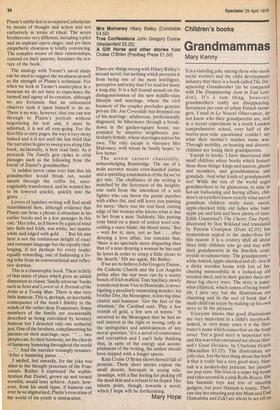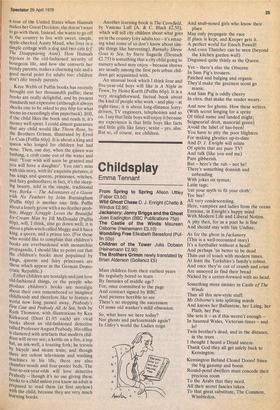Children's books
Grandmammas
Mary Kenny
It is a standing joke among those who mock social workers and the child development industry that there is a book called The Dis appearing Grandmother (to be compared with The Disappearing Aunt in East Lon don). It's a rum thing, however; grandmothers really are disappearing. Seventeen per cent of urban French teenagers, I read in Le Nouvel Observateur, do not know who their grandparents are, and in a recent experiment in a south London comprehensive school, over half of the twelve-year-olds questioned couldn't say what their mother's maiden name was. Through mobility, re-housing and divorce, children are losing their grandparents.
Except in books. I have discovered that small children adore books which feature these three things: kings and queens, ghosts and monsters, and grandmammas and grandads. And what kinds of grandparents tool While the rest of the world urges grandmothers to be glamorous, to take to hot-air ballooning and having affairs, children's storytellers know exactly what sort of grandmas children really want; sweet, apple-checked little old ladies who bake apple pie and knit and have plenty of time. Edith Unnerstad's The Cherry Tree Party, illustrated by Bon Wikland and translated by Patricia Crampton (Dent E2.95) has tremendous appeal to the under-fives for this reason: it is a country idyll all about three little children who go and stay with their grandparents in the Swedish countryside in summertime. The grandparents — white-haired, apple-checked and all —live in a dinky wooden house with lots of fascinating memorabilia in a locked-up old wooden shed; and in their garden there are three big cherry trees. The story is somewhat elliptical, which comes of being Swedish, I dare say; but the illustrations are charming and its the sort of book that a small child can enjoy by making up his own story to fit the pictures. Everyone knows that good illustrations. are very important in a child's storybook; indeed, in very many cases it is the illustrator's name which comes first on the front cover. Yet a good story is important too, and this was what entranced me about Hannah's Great Decision, by Charlotte Firmin (Macmillan 13.25). The illustrations are jolly nice, but the best thing about this book is that it really has a very good story. Hannah is a modern-day princess: her parents are pop stars. She lives in a super big house and rides around in a pink Rolls-Royce. She has fantastic toys and lots of amazing gadgets; but poor Hannah is lonely. Then, one day her amazing pop star Mum and Dad (Samantha and Zak) are about to set off on
a tour of the United States when Hannah makes her Great Decision; she doesn't want to go with them. Instead, she wants to go off to the country to live with sweet, simple, apple-cheeked Aunty Maud, who lives in a simple cottage with a dog and two cats (cf The Disappearing Aunt). How Hannah rejoices in the old-fashioned security of bourgeois life, and how she converts her trendy parents, makes a charming tale and a good moral point for adults too: children don't like trendy parents.
Kaye Webb of Puffin books has recently brought out her thousandth puffin; these books are really delightful, and by present standards not expensive (although it always shocks one to be asked to pay 60p for what seems an exceedingly slim paperback). Still, if the child likes the book and reads it, it's money well spent. I could almost guarantee that any child would like Thorn Rose, by the Brothers Grimm, illustrated by Errol Le Cain (Puffin 60p). It is about a king and queen who longed for children but had none. Then, one day, when the queen was bathing, a crab came out of the water and said: 'Your wish will soon be granted and You will have a daughter'. You can't miss With this story, with its' exquisite pictures; it has kings and queens, princesses, witches, and fairy godmothers; in fact, it's the sleeping beauty, told in the simple, traditional way. Borka — The Adventures of a Goose With No Feathers by John Burningham (Puffin 60p) is another nice little Puffin about a lonely goose with a no-feather problem; Maggy Scraggle Loves the Beautiful Ice-Cream Man by Jill McDonald (Puffin 60p), will, I think, also go down well; it is about a plain witch called Maggy and it has a king, a queen, and a prince too. (For those Who would like to complain that children's books are overburdened with monarchist Propaganda, I should like to point out that the children's books most populated by kings, queens and fairy princesses are those which appear in the German Democratic Republic.) Either children are nostalgic and just love old-fashioned things, or the people who Produce children's books are nostalgic about their own remembered or imagined childhoods and therefore like to feature a World now long passed away. Peabody's First Case and Peabody All At Sea, both by Ruth Thomson, with illustrations by Ken Kirkwood (Dent £1.95 each) are vivid books about an old-fashioned detective called Professor August Peabody. His office IS cluttered with artefacts that modern children will never see; a kettle on a fire, a top hat, an ink-well, a toasting fork; he travels by bicycle and steam train; and though there are colour televisions and washing Machines in his life, there are also Chambermaids and four-poster beds. The four-to-six-year-olds will love detective Peabody – though it's no use giving these books to a child unless you know an adult is Prepared to read them (at first anyhow) With the child, because they are very much learning books. Another learning book is The Cornfield, by Vanessa Luff (A. & C. Black f2.50), which will tell city children about what _goes on in the country (city adults too – it's amazing what some of us don't know about simple things like harvesting). Barnaby Shrew Goes to Sea, by Steve Sugarde (Deutsch £2.75) is something that a city child going to nursery school may enjoy –because shrews are usually among the first pets urban children get acquainted with.
An unusual book which I think four and five-year-old boys will like is A Night in Town, by Heinz Kurth (Puffin 60p). It is a very straightforward, factual book about the kind of people who work – and play – at night-time; it is about long-distance lorrydrivers, TV engineers, telephonists and so on. I say that little boys will enjoy it because my experience is that little boys like facts and little girls like fancy; sexist – yes, alas. But so, of course, are children.



































 Previous page
Previous page